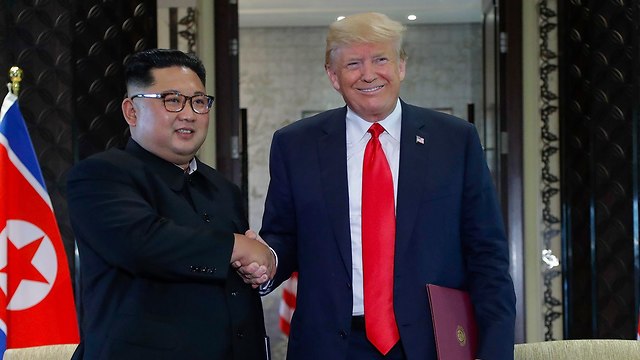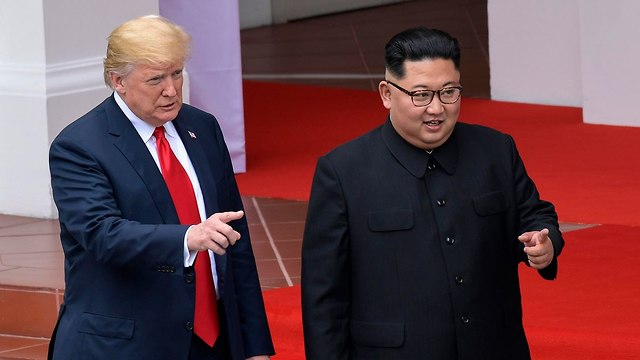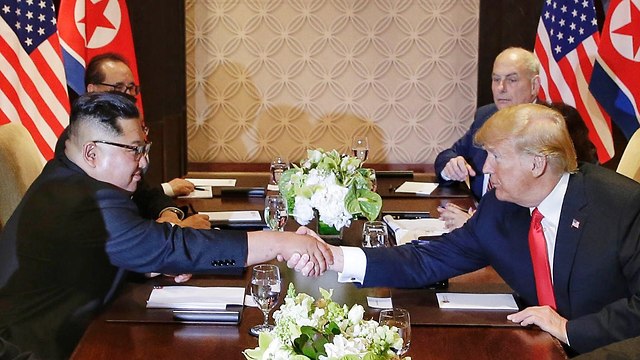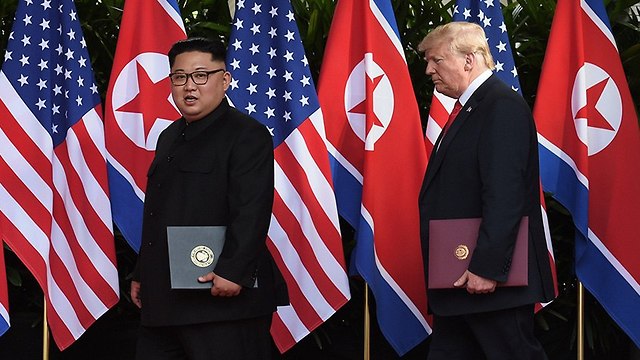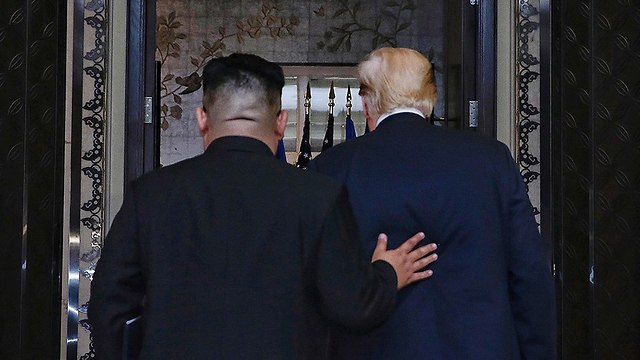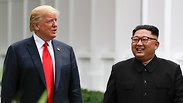
US President Donald Trump has apparently agreed on a step-by-step denuclearization process by North Korea in return for reciprocal concessions from the United States, according to a report by the Korean Central News Agency (KCNA) on the historic summit between the two leaders in Singapore.
"Kim Jong Un and Trump had the shared recognition to the effect that it is important to abide by the principle of step-by-step and simultaneous action in achieving peace, stability and denuclearization of the Korean Peninsula," KCNA said.
There was little else mention of denuclearization of North Korea in the statement, which mainly focused on stopping hostilities between North Korea and the United States. No mention was made of officially ending the state of war between North and South Korea after their 1950-53 conflict ended in a truce not a peace treaty.
Kim Jong Un said that if the US side took "genuine measures for building trust," North Korea would continue to take "additional good-will measures of next stage commensurate with them."
The North's state media framed Tuesday's summit as a win for Pyongyang as it listed concessions made by Trump, with North Korea dubbing the summit in Singapore "the meeting of the century" on the front page of its official party newspaper.
Trump has also expressed his intention to halt US-South Korea joint military exercises, offer security guarantees to the North and lift sanctions against it as relations improve.
The US president had said in a news conference on Tuesday he would like to lift sanctions against North Korea but it would not happen immediately.
He also said he'd like to remove all 28,500 US troops stationed in the South, although he made clear this was an option for the future, not a part of current negotiations.
Kim, North Korean media reported, told Trump it was "urgent" for their two countries to halt "irritating and hostile military actions against each other," adding the two nations should commit to avoid antagonizing each other and take legal, institutional steps to guarantee it.
The report added Trump said he "understood" and promised to halt joint US-South Korea military exercises while talks with the North were continuing.
Trump and Kim also invited each other to visit the United States and North Korea, respectively, and both accepted the invitation, KCNA reported on Wednesday.
"Kim Jong Un invited Trump to visit Pyongyang at a convenient time and Trump invited Kim Jong Un to visit the US. The two top leaders gladly accepted each other's invitation," KCNA said.
A surprise pledge
Trump's pledge to end joint exercises with South Korea without explicit concessions from North Korea to lower the military threat posed by Pyongyang took South Korean and US military officials by surprise.
"We're not going to be doing the war games as long as we're negotiating in good faith," Trump confirmed to Fox News Channel in an interview in Singapore after the summit.
"So that's good for a number of reasons, in addition to which we save a tremendous amount of money," Trump said. "You know, those things, they cost. I hate to appear a businessman, but I kept saying, what's it costing?"
In a later interview with the Voice of America, Trump said the North Koreans were "very happy" about his decision to freeze the exercises "because it is so provocative."
Trump also seemed annoyed that US bomber aircraft make six-plus hour flights from the Pacific island of Guam to the Korean peninsula as part of its exercise routine.
"Six and a half hours—that's a long time for these big massive planes to be flying to South Korea to practice and then drop bombs all over the place, and then go back to Guam," Trump said. "I know a lot about airplanes; it's very expensive."
US Republican Senator Lindsey Graham said Trump's cost reasoning for halting the exercises was "ridiculous."
"It's not a burden onto the American taxpayer to have a forward deployed force in South Korea," Graham told CNN. "It brings stability. It's a warning to China that you can't just take over the whole region. So I reject that analysis that it costs too much, but I do accept the proposition, let's stand down (on military exercises) and see if we can find a better way here."
There was some confusion over precisely what military cooperation with South Korea Trump had promised to halt.
The US-South Korean exercise calendar hits a high point every year with the Foal Eagle and Max Thunder drills, which both wrapped up last month. Another major drill is due in August, known as Ulchi Freedom Guardian.
The United States maintains around 28,500 soldiers in South Korea, which remains in a technical state of war with the North after their 1950-53 conflict ended in a truce rather than a peace treaty.
Mattis 'in full alignment' with Trump
In the wake of Trump's unexpected, almost offhand comments to reporters, the Pentagon had nothing to say about the future of the war games. Several hours after Trump's remarks, the Pentagon put out a brief statement welcoming "positive news" from Singapore, but it remained silent on whether Ulchi Freedom Guardian will proceed.
Defense Secretary Jim Mattis' chief spokeswoman, Dana W. White, told reporters he was "in full alignment" with Trump and had been consulted in advance on all aspects of the Singapore talks. "There were no surprises," she said.
If Mattis was aware that Trump was going to announce a suspension of military exercises, he apparently did not share that information with the South Koreans or with the military organization most directly affected: US Forces Korea.
That US command said it had "received no updated guidance on the execution or cessation of training exercises."
The South Korean government also appeared caught off guard. Seoul's presidential office told The Associated Press that it was trying to parse Trump's comments. The South Korean military seemed similarly surprised.
"At this current point, there is a need to discern the exact meaning and intent of President Trump's comments," Seoul's Defense Ministry said, adding that there have been no discussions yet with Washington on modifying drills set for August.
A degree of confusion arose after Vice President Mike Pence spoke to senators at a lunch closed to media coverage. Sen. Cory Gardner, Republican of Colorado, said Pence indicated that "exercises will continue," although Sen. Rand Paul, a Kentucky Republican, said this referred to routine, daily training in South Korea, not the large-scale war games that Trump said are suspended.
Critics: Trump gave away 'too much'
Trump's administration had previously ruled out any concessions or lifting of sanctions without North Korea's commitment to complete, verifiable and irreversible steps to scrap a nuclear arsenal that is advanced enough to threaten the United States.
Critics in the United States said Trump had given away too much at a meeting that gave Kim international standing. The North Korean leader had been isolated, his country accused by rights groups of widespread human rights abuses and under UN sanctions for its nuclear and ballistic missile programs.
"For North Korea, they got exactly what they wanted," said Moon Seong-mook, a former South Korean military official and current head of the Unification Strategy Center in Seoul. "They had a summit as a nuclear state with Kim on equal turf with Trump, got the United States to halt joint military exercises with South Korea. It's a win for Kim Jong Un."
Officials from South Korea and Japan were expected to discuss the issue when US Secretary of State Mike Pompeo arrives in Seoul later on Wednesday. He is scheduled to meet South Korean President Moon Jae-in early on Thursday and then hold a trilateral meeting with Foreign Minister Kang Kyung-wha and Japanese Foreign Minister Taro Kono.
Japan's Minister of Defense Itsunori Onodera said that, while North Korea had pledged denuclearization, no concrete steps had been taken and Japan would not let down its guard.
"We see US South Korean joint exercises and the US military presence in South Korea as vital to security in East Asia," Onodera told reporters. "It is up to the US and South Korea to decide about their joint exercises. We have no intention of changing our joint drills with the US."
Japan, along with China, is expected to bear much of the initial costs of North Korea's denuclearization but would only start shouldering costs after the International Atomic Energy Agency restarts inspections, Japanese Chief Cabinet Secretary Yoshihide Suga told reporters.
 |
The Associated Press contributed to this story.















